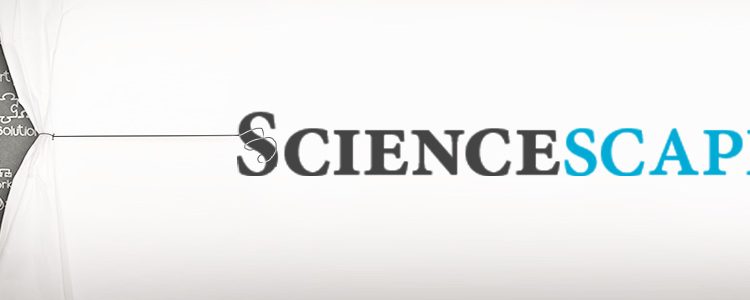Experts’ Take: Can Sciencescape Help Researchers Stay Current With the Literature?

The one disadvantage of the explosion of scientific publishing is the problem it presents for researchers seeking to stay up to date with the latest results in their area of research. No one can possibly review all the papers being published in a given field. How to sift through the mass of material to separate the wheat from the chaff? The recent start-up Sciencescape aims to help researchers in this quest.
Sciencescape: Reference Retrieval and More
Sciencescape provides access to some 22 million papers in the biomedical field, both old and new. A user selects one or more areas of interest—genes, drugs, etc.—and searches the database for papers. Other searchable databases do this much, but Sciencescape claims to go a few steps further. Sciencescape also has a variety of tools that allow you to store references in a library and facilitate sharing papers with other researchers.
Let’s find out what our experts think about Sciencescape.
Our Experts’ Opinions on Sciencescape
This ser
vice provides a simple way to make sense of the seemingly insurmountable amount of new work that is published every day.
MA, Interdisciplinary Studies (14+ years of Research and Academic Editing experience, US)
Sciencescape is an excellent tool for helping researchers to stay up-to-date with the most recent and relevant research available. The point of Sciencescape is to help researchers navigate the massive increase in scientific research that has taken place in the digital age. This service provides a simple way to make sense of the seemingly insurmountable amount of new work that is published every day. By organizing publications according to areas of interest using algorithms that sort articles in real-time, Sciencescape keeps researchers on the cutting edge of the findings that relate to their work while solving the problem of publication overload.
Aside from making it easy to find new research, Sciencescape also provides data visualization that makes it easier for scientist to sense trends in the field and generate original project ideas. It also makes it simple for researchers to organize papers for their own projects by sorting them according to specific libraries as well as allowing for collaborative reference libraries so that everyone in the group stays on the same page.
Tools like this will provide instant awareness of temporal and conceptual contexts of imminent studies.
PhD, Cancer (12+ years of Scientific and Medical Writing experience, AU)
Trawling through literature is a time consuming job, and one that researchers are expected to do exhaustively. Formerly, this task involved generating sets of key words and performing searches in as many databases as might be hiding some gem of relevance. A systematic reviewer might also have a formalized strategy for finding, adding, and incorporating key synonyms and non-standard word usages into database searches to ensure that the literature is truly exhausted for data that fit stringent criteria of meta analyses. In a rapidly expanding literature base, Sciencescape promises to automate this procedure using eigenfactor metrics and random walk mathematics, likely with wonderful time saving results. Subsequent use of graphical interfaces will undoubtedly provide a rapid overview of any topic, and will punctuate moments and discoveries of particular significance according to the veritable noosphere of opinion that can be gleaned from citation networks. Tools like this will provide instant awareness of temporal and conceptual contexts of imminent studies. Some old dogs may miss their slow contemplative walks between rows of uniformly bound issues and the photocopier, some may even miss the necessity of their mailed subscriptions, but no one will scorn the utility of this tool for getting a handle on a specific area of research and staying current. Nonetheless, at the level of new and conflicting ideas, Sciencescape may facilitate dogma and could confine developments to the canon prescribed by high impact studies, which may reflect popular or commercial interests rather than the truth.
I am im
pressed by the idea behind Sciencescape and think that services such as this will become common in the near future.
PhD, Organic Chemistry (15+ years of Scientific and Medical Writing experience, US)
It uses “intelligent” algorithms that learn from user behavior and interest to help refine future searches and suggest references. I suppose this is rather like Amazon.com, which always has suggestions for additional book purchases based on ones you have already bought or looked at. I’ve found that some of these suggestions are pretty far afield of my interests, but others are spot on, so the idea has promise.
I signed on to the sciencescape.org website and five minutes later had a free account up and running. It’s easy to search for articles, read abstracts and store them in a library. When you click on the get pdf button, citations to the article appear as well as suggested articles for further reading. But abstracts are the most you can view for free. To read entire articles you have to pay fees, e.g. $20 to copy a forty year old article from Science, $40 for a recent article from Applied Microbiology and Biotechnology.
I am impressed by the idea behind Sciencescape and think that services such as this will become common in the near future. At present Sciencescape covers only biomedical areas, which is not my field, so I will not be using it much but researchers in this area should give it a try. And keep an eye out for further developments, since if Sciencescape is a success it is sure to expand into other fields and spawn a host of imitators.
Note on web address: Sciencecape.org is the research tool. Sciencescape.com is a different unrelated website.
This is
a very intriguing idea and, if done correctly, could improve on the search capabilities of programs such as PubMed significantly.
PhD, Molecular and Cellular Biology (10+ years of Scientific and Editing Experience, US)
The idea of Sciencescape is to provide a tool to search for journal articles using “modern and intelligent” algorithms to identify recent developments in the field. This is a very intriguing idea and, if done correctly, could improve on the search capabilities of programs such as PubMed significantly. For example, the ability to save manuscripts of interest would be highly valuable, and is something that PubMed currently lacks. Nevertheless, the Sciencescape technology still seems to be in development. Specifically I just performed several different searches using different search terms, and the results were not particularly impressive. For example, the top studies listed were all several years old, and my search term did not seem to be the major focus of the manuscripts and did not appear in the article titles. A comparable search in PubMed identified far more recent and relevant studies; therefore, it will be interesting to see how the technology develops and improves over time. If the developers get it right, this could be a great tool.
Th
e real utility I can see in Sciencescape is in its meta-analytic functions.
MS, Information Technology (11+ years of English–Japanese Translation experience, Japan)
The Sciencescape Journal club could be helpful in providing scientists with up-to-date scientific discoveries. The key is in the execution. In the intro video, the “problems” with google scholar and other existing publication search applications can be mitigated by a smart choice of keywords. Their algorithmic approach to gauging a paper’s significance, if it is truly becoming industry standard, will soon be adopted (and done more efficiently) by google and other established search engines. The real utility I can see in Sciencescape is in its meta-analytic functions. The idea have a lot of potential, but they must not only be something Google hasn’t thought of yet, but the overall user experience needs to outweigh the hassle of maintaining yet another user account. The timelines and maps of the most important scholarly works in a particular field are the most intriguing to me. If the tools are able to be used in a flexible manner, especially for the smaller subsets of academic fields, there is a strong possibility that this could quickly find the most meaningful papers and save a great deal of time for scientists. However, if the tools are too slow or not targeted in a useable way or the online process too burdensome, Sciencescape could end up wasting time rather than saving it.
You ca
n follow specific authors, specific journals or specific topics, but more interestingly, you can choose to follow a combination of all of the above.
PhD, Biology (12+ years of Scientific and Editing Experience, UK)
Sciencescape is a web-based tool to create personalized libraries that get automatically updated with the most recent publications in the form of “stream-feeds.” Following a model similar to social media platforms such as Facebook or Twitter, you can follow and get live feeds of publications from specific authors, specific journals, or specific topics. More interestingly, you can choose to follow a combination of authors/journals in a specific stream. For example, I can choose to follow all papers published by Prof. Gaston, all published in Diversity and Distributions, and all published in Biodiversity and Conservation in a stream focused in Conservation Biology. You can also get updates from all general high impact journals in one library while having a separate library for main specialist journals. Thus, it appears very useful to catch up with different literature streams at once with no hassle. As far as I am concerned, this is the first tool that allows automated updates on most recent literature without the needed to subscribe to the mail feeds of individual journals or academic libraries (which tend to overload anyone’s inbox). As usual, it still has some room for improvement. It would be invaluably useful if this tool allowed for selecting specific articles within a specific journal. I tried to search only ecology articles published in Nature Communications, but Scienscape does not seem to allow this type of search.





 vice provides a simple way to make sense of the seemingly insurmountable amount of new work that is published every day.
vice provides a simple way to make sense of the seemingly insurmountable amount of new work that is published every day. Tools like this will provide instant awareness of temporal and conceptual contexts of imminent studies.
Tools like this will provide instant awareness of temporal and conceptual contexts of imminent studies. pressed by the idea behind Sciencescape and think that services such as this will become common in the near future.
pressed by the idea behind Sciencescape and think that services such as this will become common in the near future. a very intriguing idea and, if done correctly, could improve on the search capabilities of programs such as PubMed significantly.
a very intriguing idea and, if done correctly, could improve on the search capabilities of programs such as PubMed significantly. e real utility I can see in Sciencescape is in its meta-analytic functions.
e real utility I can see in Sciencescape is in its meta-analytic functions. n follow specific authors, specific journals or specific topics, but more interestingly, you can choose to follow a combination of all of the above.
n follow specific authors, specific journals or specific topics, but more interestingly, you can choose to follow a combination of all of the above.



